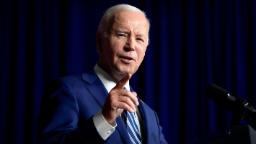Milwaukee, Wisconsin
CNN
—
President Joe Biden hasn’t let his predecessor’s previous three indictments stop him from traveling the country and trying to break through with a pitch on “Bidenomics.”
On Tuesday, he tried again in Wisconsin, hoping his argument about more jobs and manufacturing can lend at least an implicit contrast against the chaos surrounding former President Donald Trump, who was indicted for a fourth time in Georgia Monday evening.
Biden is also seeking to refocus attention on his agenda as his son Hunter Biden faces charges related to tax offenses and gun possession. As the plea talks fell apart, the prosecutor handling the case, US attorney David Weiss, last week requested and was granted “special counsel” status by Attorney General Merrick Garland, signaling that the case could continue to drag on and command media attention.
As Biden practices his now well-worn routine of avoiding comment and using his bully pulpit to highlight his legislative accomplishments, the White House, his reelection campaign and the Democratic Party are betting that voters are more concerned about kitchen table issues than Trump’s chaotic summer, pressing to make their policy arguments resonate as the former president again dominates the news cycle.
Whether Biden and his team can break through the noise generated by Trump’s legal dramas remains to be seen – and officials are calculating that indictment fatigue will set in and are aiming to flood the zone with evidence of the administration governing, according to plans that officials laid out exclusively to CNN.
There is evidence in polls that, so far, Biden and his team are not getting their message through as much as they’d like. Seven-in-ten respondents in a recent Washington Post-University of Maryland survey said they’d heard little to nothing about the Inflation Reduction Act – the sweeping climate, tax, and health care package passed along party lines last summer after more than a year of pained intraparty negotiations. Biden’s approval ratings remain underwater, and 75% of Americans said in a recent CNN poll that economic conditions were poor.
Biden’s aides argue it will take time for his legislative victories to translate into meaningful improvements in Americans’ lives, and by extension, a political boost for him. But even the president seemed to acknowledge he had a branding problem during remarks at a fundraiser last week in Utah.
“The Inflation Reduction Act – I wish I hadn’t called it that,” he said. “It has less to do with reducing inflation than it does to do with dealing with providing for alternatives that generate economic growth. And so, we’re now in a situation where if you take a look at what we’re doing in the Inflation Reduction Act, we’re literally reducing the cost of people being able to meet their basic needs.”
Wednesday marks the one-year anniversary of the Inflation Reduction Act. Ahead of that one-year milestone, top administration officials have fanned out across the country this week and last in support of the bill, including Biden’s Tuesday trip to Ingeteam in Milwaukee – the same city where next week’s first GOP presidential debate will take place. Biden is expected to detail how the law has affected production of onshore wind turbine generators.
“We’re investing in America,” Biden said at the Ingeteam manufacturing plant in Milwaukee, Wisconsin. “Folks, that’s Bidenomics – it’s about growing the economy by strengthening the middle class.”
“Bidenomics is just another way of saying restoring the American dream,” he added.
The company expects orders of its wind turbine generators to double next year and recently entered a new manufacturing arena: electric vehicle charging stations, which will create 100 jobs. Siemens will also announce a new solar energy manufacturing project in Wisconsin to coincide with Biden’s visit.
But there’s also a concerted effort behind the scenes to get Biden’s most ardent supporters and influencers on board. In concert with the campaign, the Democratic National Committee is deploying a grassroots strategy to sell the bill to its best on-the-ground advocates across battleground states with a three-pronged organizing, messaging and earned media strategy, officials detailed exclusively to CNN.
“Team Biden-Harris is using the law’s anniversary as an opportunity to arm our grassroots network and Democratic leaders across the country with tools to communicate how the landmark legislation is creating an economic boom, generating jobs, lowering costs, making the largest investment in climate action in history, and boosting American manufacturing in their own communities,” campaign manager Julie Chavez Rodriguez said in a statement on this week’s push.
That includes a series of grassroots briefing calls in battleground states, including Arizona, Georgia, Pennsylvania, Michigan, North Carolina, Nevada, and Wisconsin. Those calls will also arm attendees with “shareable content,” including the bill’s tangible impacts on their respective states, as the campaign seeks to generate digital word-of-mouth.
“This focus on leveraging people’s personal networks, through amplifying core messages online and having personal conversations offline, builds on a central pillar of our organizing program heading into 2024,” the official said.
The “meeting voters where they are” strategy will be critical to reaching young voters in particular, who consume their news in different ways, including through social media. By the fall of 2024, experts predict Gen-Z and Millennials – a range roughly spanning those older than 18 but younger than 45 – will make up 40% of the vote-share.
The DNC is also supporting a series of news conference events on the ground and virtually across battleground states Tuesday and Wednesday with state party leaders.
And the national party has also provided all 50 state parties a “messaging toolkit” on the bill, encouraging state leaders to “leverage the supportive voices of the Biden-Harris coalition in their own local communities, platforms, and on the airwaves.”

